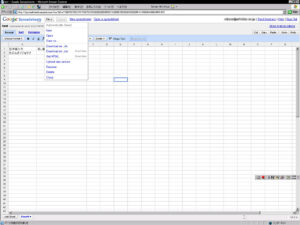Essential Bookkeeping Practices For Start-Ups
Launching your own business is thrilling – it’s a chance to turn your dreams into reality. But it’s not just about the big idea; there’s a lot of day-to-day stuff to keep up with, too. One of the most important tasks is to keep a clear record of every single thing that has to do with money. Whether it’s holding onto purchase receipts, making sure you pay your staff correctly, or just jotting down every sale, all these details need to be written down and kept safe. This isn’t just about being neat and organized. It’s about really getting to grips with how your business is doing money-wise and making sure you’re on the right side of the law when it comes to taxes.
You might think that keeping track of your cash is pretty straightforward, but it’s surprising how many little transactions can happen in a day, a week, or a month. They all add up. That’s why it’s super important to take this seriously from the start. By doing so, you’ll have a real-time snapshot of your business’s financial health. This isn’t just about avoiding trouble with tax authorities; it’s also about knowing how much you can spend on growing your business, and when you might need to tighten the purse strings. Keeping a good handle on your finances can help you make smart choices that will keep your business thriving in the long run.
Don’t underestimate the basics
 Believe it or not, there are still plenty of small shops and side hustles out there that run their finances the old-school way: with a pen and paper, and maybe an old shoebox where they stash all their receipts and bills. It might sound a bit out of date in this high-tech world, but for a tiny business that doesn’t do a ton of sales or services, this can actually work out just fine. Maybe they don’t use fancy card machines or online payments, and they’re still writing out invoices by hand or getting paid right there on the spot with cash or a check. For these folks, keeping a simple written record of every sale or job, all their customers, and what money’s come in and out is pretty straightforward.
Believe it or not, there are still plenty of small shops and side hustles out there that run their finances the old-school way: with a pen and paper, and maybe an old shoebox where they stash all their receipts and bills. It might sound a bit out of date in this high-tech world, but for a tiny business that doesn’t do a ton of sales or services, this can actually work out just fine. Maybe they don’t use fancy card machines or online payments, and they’re still writing out invoices by hand or getting paid right there on the spot with cash or a check. For these folks, keeping a simple written record of every sale or job, all their customers, and what money’s come in and out is pretty straightforward.
Now, if you’re starting to get serious about growing your business and want to keep on top of things, sticking with the shoebox might not cut it anymore. When your business begins to pick up – more customers, more sales, maybe even some employees – it’s easy for the money side of things to get complicated. That’s when you want to start looking at systems that are a bit more up to date. These systems can track everything automatically and give you a clearer picture of where your business stands financially at any given moment.
With more transactions happening, and maybe more complex ones like offering credit to customers or handling different types of payments, you need something that’s reliable and doesn’t miss a beat. There’s a bunch of software out there that’s not too expensive and designed just for small businesses to keep their finances neat and tidy. This kind of system takes away the headache of going through piles of paper to find that one receipt from months ago. Everything’s stored digitally, so it’s just a few clicks away whenever you need it.
So, as your little venture starts to grow and you find yourself spending too much time playing detective with your own accounts, consider switching to a system that’s designed for the job. You’ll save time, reduce mistakes, and you’ll always have a good grip on the financial pulse of your business. Plus, when tax time rolls around, you won’t be the one sweating it out, trying to make sense of a year’s worth of paper stuffed in a shoebox. A good system can sort all that out for you, letting you focus on what you do best – running your business.
The power of spreadsheets
 In today’s world, almost everyone has a computer or a smartphone, and that’s all you need to start getting your business’s finances organized with spreadsheets. They’re a no-fuss solution that can do wonders for folks just getting their feet wet in the business world. If you’re kicking off a new venture or maybe running a little weekend gig, you might not have a lot of cash to throw around. That’s where spreadsheets come in – they’re pretty much free, especially with online options like Google Sheets, and they do the job without any extra fluff. They’re perfect for when your business is small enough to handle without fancy programs, keeping track of what’s coming in and going out without costing you a dime.
In today’s world, almost everyone has a computer or a smartphone, and that’s all you need to start getting your business’s finances organized with spreadsheets. They’re a no-fuss solution that can do wonders for folks just getting their feet wet in the business world. If you’re kicking off a new venture or maybe running a little weekend gig, you might not have a lot of cash to throw around. That’s where spreadsheets come in – they’re pretty much free, especially with online options like Google Sheets, and they do the job without any extra fluff. They’re perfect for when your business is small enough to handle without fancy programs, keeping track of what’s coming in and going out without costing you a dime.
With a spreadsheet, you’re basically giving your business a quick and dirty accounting setup. You can make a list of all your sales and the money you’ve spent, keep tabs on what you’re billing clients, and even do some basic math to figure out if you’re making a profit. Need to know how much you can spend on new equipment or whether you can afford to run a new ad? A spreadsheet can help you lay out a budget so you don’t overspend. And the best part is, you don’t need to be a math whiz – the spreadsheet does most of the calculating for you.
But let’s say business starts booming – you’re selling more, your list of clients is growing, maybe you’ve even hired some help. Suddenly, those spreadsheets might start to feel a bit cramped. When your business’s financial needs get more complex – like if you need to handle different tax rates or manage lots of bills – that’s when you might look at specialized accounting software. These programs are built to handle the heavy lifting when spreadsheets start to overflow.
These software options often come with a cost, but they pack a punch for your penny. They can sort out the nitty-gritty details, like who owes you money and how much tax you’ll need to pay. They can save you time and worry, making sure nothing slips through the cracks. Plus, if you’re ever scratching your head over your business’s finances, good software can make it a lot easier to see what’s going on at a glance. It’s all about finding the right tool for the job, and as your business grows, the right tools can make all the difference.
Embrace accounting software
 If you’re really focused on making your business work, getting accounting software could be a smart move. This type of software connects right to your bank account, which is a great way to keep track of your money coming in and going out without much hassle. Plus, it’s less likely you’ll make mistakes since the software handles a lot of the tricky stuff. It can even help you look more professional by creating neat invoices for your customers, keep an eye on any money you’re owed, and make sure everything is in order for your accountant when it’s time to deal with taxes.
If you’re really focused on making your business work, getting accounting software could be a smart move. This type of software connects right to your bank account, which is a great way to keep track of your money coming in and going out without much hassle. Plus, it’s less likely you’ll make mistakes since the software handles a lot of the tricky stuff. It can even help you look more professional by creating neat invoices for your customers, keep an eye on any money you’re owed, and make sure everything is in order for your accountant when it’s time to deal with taxes.
Choosing accounting software that’s based online – what tech folks call ‘cloud-based’ – has its own perks. You get to see your financial information updated live, as it happens. This is super handy if you need to make quick decisions and want to know the latest about your business’s finances. It’s also generally more secure because the companies that run these services use strong security measures to protect your data.
Another bonus of cloud-based software is how convenient it is. You can log in from anywhere, whether you’re on a beach with your phone or at a café with your laptop. You’re not tied to a desk. This kind of accessibility means you can always have your finger on the pulse of your business’s finances, which can give you a lot of peace of mind.
In short, using modern accounting software can make the whole process of managing your business money much simpler and more reliable. It can save you time on bookkeeping, help prevent costly mistakes, and even give your business an edge by enabling you to handle your financial stuff efficiently and on the go. For someone who’s serious about their business, these are benefits that can really make a difference.
Stay on top of your cash flow
 Choosing the right accounting system might not be the most exciting part of running a business, but think of it as your secret weapon for making smart choices. A good system is like having a financial buddy that’s always awake, keeping an eye on your money around the clock. This buddy tells you what’s happening with your cash right now, not just when you’re looking back at the end of the year. It’s like having a dashboard in your car; you can see if you’re running low on gas (or cash!) before you’re stuck on the side of the road.
Choosing the right accounting system might not be the most exciting part of running a business, but think of it as your secret weapon for making smart choices. A good system is like having a financial buddy that’s always awake, keeping an eye on your money around the clock. This buddy tells you what’s happening with your cash right now, not just when you’re looking back at the end of the year. It’s like having a dashboard in your car; you can see if you’re running low on gas (or cash!) before you’re stuck on the side of the road.
Now, imagine you could see exactly which things in your business are making the most money. That’s what tracking your cash flow trends can do. It’s like having a highlight reel of your business’s best-selling items or services. Say you run a coffee shop; your accounting system could show you that those fancy seasonal lattes are bringing in more bucks than your plain old drip coffee. Or maybe you’ll notice that you get a rush of big spenders right after the local soccer games. With this intel, you can focus on brewing what sells best and maybe even sponsor a soccer team to get more of those customers in your door.
But it’s not just about watching the money come in; a good system also points out where it’s pouring out. Maybe you’re spending a ton on fancy napkins that no one really cares about, or your overnight shipping costs are through the roof. When you can see what’s costing you the most, you can figure out how to cut those costs or pass them along. You might switch to a less expensive napkin or start charging a bit more for that overnight shipping. These little tweaks can help you keep more money in your pocket at the end of the day.
And the best part? When you’re watching these trends, you can spot cool opportunities to grow your business. Maybe you’ll see a chance to expand your line of best-sellers, or find a new market that’s just waiting for what you offer. It’s like having a map to buried treasure, and your accounting system is the “X” marking the spot. Instead of guessing where to dig, you’ll have a clear path to follow that could lead to more sales, happier customers, and a healthier bottom line.
Final Thought
Starting your own business is a bit like setting sail on a big ocean adventure. Before you can catch the wind in your sails, you need to make sure you’ve got a trusty map—that’s where picking the right accounting system comes in. It’s your map to keeping track of every dollar and cent that flows in and out of your business. You need a system that’s easy for you to understand and use every day, so you always know how much cash you’ve got on hand, can make sure Uncle Sam gets his share come tax time, and can spot how the money moves—like which months you’re raking it in and when it’s just trickling in. Talking to an accountant can be like finding a seasoned captain to help you navigate. They know the seas well and can recommend the best accounting tools that’ll work nicely with the way they handle your numbers.
Think of your financial records as the heartbeat of your business venture. Keeping them organized isn’t just something that’s nice to do; it’s absolutely crucial. It’s like making sure your boat doesn’t have any leaks. If your books are a mess, you could be sailing into a storm without even knowing it. But when they’re shipshape, you’ll be able to spot trouble way before it’s on the horizon and steer clear of it. Plus, when it’s time to grow your business, those tidy records will be like a strong wind at your back, helping push you towards new and exciting opportunities.
Unlock exclusive content, be the first to know about our exciting updates, and join a community that thrives on innovation and growth.
Sign up for our newsletter now and never miss a beat in the dynamic world of business!
